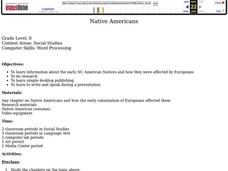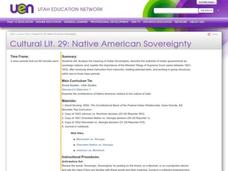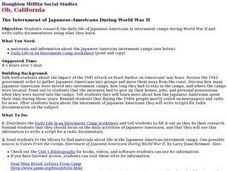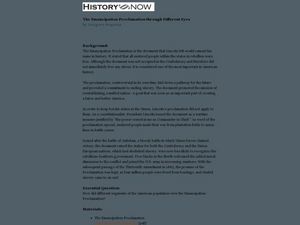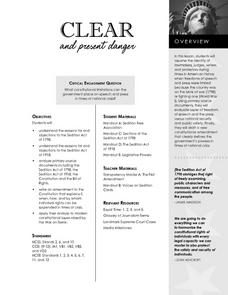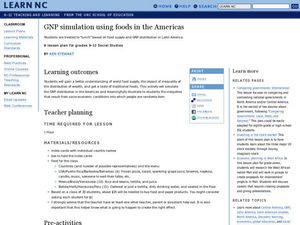Curated OER
The U. S. Constitution (3)
In this online interactive American history worksheet, students answer 10 multiple choice questions regarding the early U. S. Constitution. Students may submit their answers to be scored.
Curated OER
The Institutions of Government: The Judiciary
Students explain the difference between tribal, state and federal sovereignty. Using the internet, they read Supreme Court cases that focus on Native American law. They compare and contrast the view of the case from the Native...
Curated OER
Native Americans
Eighth graders are assigned a group of Native Americans from the North Carolina area to study. They research and write a paper, including sections on family, government, food, clothing, shelter, European contact, artifacts and give an...
Curated OER
Native American Sovereignty
Students analyze the meaning of Indian Sovereignty. They describe the authority of Indian governments as sovereign nations, and explain the importance of the Marshal Trilogy of Supreme Court cases between 1821-1832. They examine the...
Curated OER
Native American Sovereignty
Students analyze the meaning of Indian Sovereignty, describe the authority of Indian governments as sovereign nations; and, explain the importance of the Marshal Trilogy of Supreme Court cases between 1821-1832.
Curated OER
Government
Eighth graders analyze the purposes of government. They examine or assess the importance of citizenship to the individual or to society at large (e.g., the importance of voting). Students explain the structure and functions of the three...
Curated OER
Primary Documents: The President and African Americans
Students examine the efforts of the federal government to address discrimination in the U.S. before and after WWII. They read and discuss two executive orders, complete a worksheet, and answer discussion questions.
Curated OER
The Internment of Japanese-Americans During World War II
Eleventh graders research the daily life of Japanese-Americans in internment camps during World War II and write radio documentaries using what they learn.
Museum of Tolerance
The Role of Citizens in a Participatory Democracy
Groups research participatory democracies and compare the role and rights of citizens in ancient history with those in recent U.S. history. Guided by a series of questions, individuals compose a persuasive essay in which they discuss the...
DocsTeach
The Impact of Bloody Sunday in Selma
Who is to blame when a peaceful protest turns deadly? Scholars research the impact of the civil rights march in Selma, better known as Bloody Sunday. The activity uses files from the FBI's investigation to help academics understand the...
Curated OER
The Emancipation Proclamation Through Different Eyes
Students examine how various segments of the American population viewed the Emancipation Proclamation. They read the Emancipation Proclamation, analyze key terms and statements in the document, and participate in a debate.
Curated OER
Mount Rushmore
How did those faces get on that mountain, and why did they choose those particular presidents? Learn about Mount Rushmore's construction and the history behind the men represented on the mountainside with a short reading passage and set...
City University of New York
The Split Over Suffrage
Compare and contrast Frederick Douglass's and the National Women's Suffrage Association's stances on equal rights and suffrage with a series of documents and worksheets. Learners work together or independently to complete the packet, and...
PBS
The Roosevelts: An Intimate History—Snapshot Lessons
The Roosevelt family was one of the most influential and prominent political forces in the 20th century, leaving behind a wide-ranging legacy of conservation, progressivism, and economic growth. Learn more about President Theodore...
National Endowment for the Humanities
The "To Do List" of the Continental Congress
What is on your to-do list today? The second lesson of a three-part series on Lost Heroes of America investigates the laundry list of items in front of the second Continental Congress. Scholars research, analyze, and present information...
US National Archives
Inaugural Quiz!
Inauguration Day is a time-honored tradition to celebrate the transition between presidential inaugurations. How much do you know about the history of the ceremony itself? High schoolers test knowledge about Inauguration Day with an...
Ashbrook Center at Ashland University
Bill of Rights
Do citizens need protection from the federal government? Scholars investigate why the framers of the Constitution created the first 10 amendments and what these amendments mean to citizens of the United States more than 200 years later....
Curated OER
The Bill of Rights and You
The right to life, liberty, and the pursuit of happiness. The lesson explains what the Bill of Rights is and how it applies to everyday life, like freedom of speech or the right to a jury trial. Young historians complete hands-on...
Curated OER
The Impact of the IWW on the Nation or Who were the Wobblies?
Students evaluate the role labor groups had on the U.S. Government in the early 1900's. In this teaching American history lesson plan, students complete several activities, including response writing and listening to music, that...
Curated OER
The First Years of the Union (1797-1809)
In this online interactive history learning exercise, students respond to 11 short answer and essay questions about the United States between 1797 and 1809. Students may check some of their answers on the interactive learning exercise.
Curated OER
Understanding Treaties: Students Explore the Lives of Yakama People Before and After Treaties
Students analyze treaties made between the US government and Native American tribes. In this government lesson, students evaluate bias emotionally connect with what was gained and lost during the late 1700's. This is a 3 part lesson...
Curated OER
Clear and Present Danger
Students assume identities of lawmakers, judges, writers, and protestors during times in American history when freedoms of speech and press were limited because country was on the brink of war or fighting one. Students use primary source...
Curated OER
Crossroads of the Continent: Early Trade in Kansas
Students study early Native American-European trade. They play bartering games to discover trade as an economic funtion, as well as other implications of trading one good for another.
Curated OER
GNP Simulation Using Foods in the Americas
Young scholars explore food supply distribution. In this GNP distribution lesson, students participate in a simulation that requires them to eat foods from the American continents. Young scholars are served according to their chance...
Other popular searches
- Early American Government
- American Government Lesson
- American Government Projects
- Roots of American Government
- Colonial American Government
- American Government & Politics
- American Government History
- Native American Government
- American Government Branches
- Origins of American Government
- Latin American Governments
- American Government Simulation




